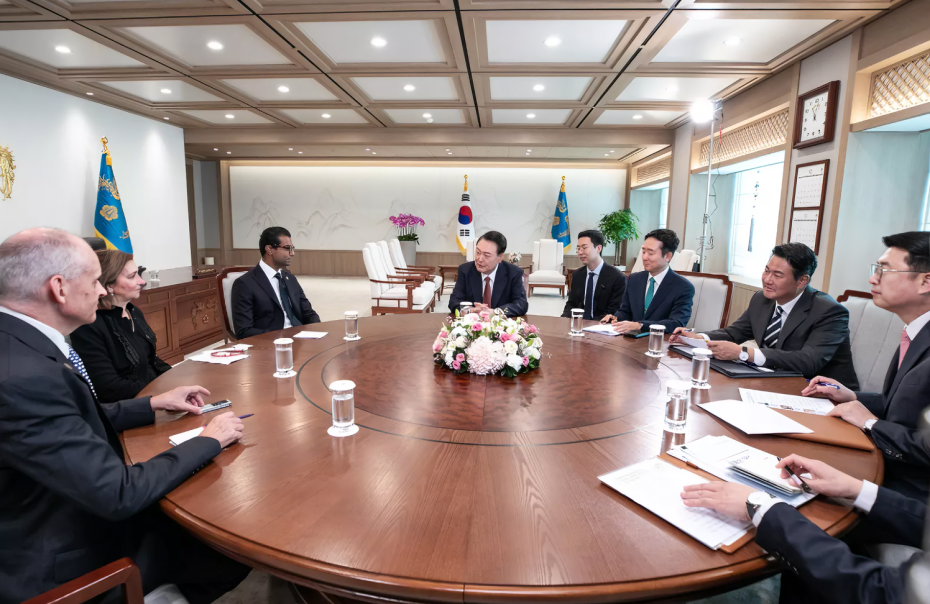South Korea's President Yoon Discusses National Security and Domestic Reforms
 Caroline
Caroline
Defense and Security
Q: Given recent developments, how concerned are you about potential confrontation with North Korea?
A: The unpredictability of the North Korean regime is well-known, but South Korea has been continuously strengthening its defense capabilities since the Korean War. North Korea’s reliance on nuclear power is a sign of its conventional military weaknesses, and our strong nuclear partnership with the U.S. ensures that we are well-prepared for any potential threats. I want to reassure the international community that South Korea is more than capable of defending itself, and there’s no reason to fear escalation from the North.
Q: North Korea has accused South Korea of provocation. How do you respond, and what actions do you envision for conciliation?
Our defense strategy is designed to maintain peace. From the inception of the Republic of Korea, we’ve never intended to invade the North. North Korea’s claims are baseless. With South Korea’s economic strength—our GNI is 60 times that of North Korea—we have consistently offered humanitarian aid, as our constitution recognizes North Koreans as citizens. However, the North Korean leadership has been selective in accepting this aid. I’ve publicly stated that if North Korea takes genuine steps toward denuclearization, South Korea will offer significant economic and industrial support.
Q: What is your stance on South Korea developing its own nuclear weapons, given public support for such a move?
While surveys show broad public backing for South Korea acquiring its own nuclear arsenal, I believe this would pose a significant threat to regional and global security. If South Korea pursued nuclear weapons, it could prompt Japan and Taiwan to follow suit, which would escalate security risks in the region. South Korea remains firmly committed to the Non-Proliferation Treaty (NPT), and our enhanced nuclear alliance with the U.S. serves as a strong deterrent. The establishment of the Nuclear Consultative Group further reinforces our partnership with the U.S. on this matter.
Q: How do you respond to North Korea’s military cooperation with Russia amid the Ukraine conflict?
North Korea’s deployment of troops to Russia is a violation of international law and represents a grave threat to global security. Should Russia provide North Korea with advanced military technology or combat experience from the ongoing war in Ukraine, the potential threat to South Korea’s security will grow. We are working with our international allies to take appropriate countermeasures, while also supporting Ukraine through humanitarian aid and reconstruction efforts as part of our Peace and Solidarity Initiative.
Domestic Reform and Future Vision
Q: How do you plan to balance national security with domestic reforms?
I believe foreign policy and domestic reforms are intrinsically connected. As South Korea faces the challenges of the Fourth Industrial Revolution, our domestic institutions must adapt accordingly. Reforms in areas such as labor, education, healthcare, and pensions are crucial for maintaining South Korea’s competitiveness on the global stage. Without these necessary structural changes, we risk falling behind.
In education, it’s essential to update curricula to keep pace with technological advancements like AI and digitalization. Healthcare must address regional disparities, especially given the growing divide between urban and rural areas. Labor reforms are also critical to meet the demands of modern industries, ensuring more flexibility and better protection for vulnerable workers.
Q: Are you confident these reforms will succeed, given the political and social challenges?
Yes, I am confident. While I may not complete every reform during my presidency, I am laying a strong foundation for future administrations to continue the work. These reforms are vital for South Korea’s survival and prosperity in an increasingly fast-changing world. While they may be politically unpopular at times, they are crucial for securing South Korea’s future.
Q: What role do you see for immigration in South Korea's economy?
Immigration is a key strategy for addressing our labor shortages, particularly in skilled sectors. We are increasing support for multicultural families, helping them integrate into society through language and cultural education. Additionally, we aim to attract skilled workers by making it easier for them to gain citizenship or residency. This will expand our talent pool and fill essential roles in industries critical to our economic growth.
Q: What steps are you taking to address the widening gender divide in South Korea?
The gender divide is a multifaceted issue, particularly rooted in Korea’s rapid industrialization. A significant contributor is the intense competition within the workforce, which often discriminates against women, especially in terms of career advancement after childbirth. We need to change societal perceptions and create a more supportive environment for women, ensuring that marriage or child-rearing does not hinder career progression. Labor reform will also play a crucial role in focusing on expertise and creativity over long working hours as measures of skill.
Q: Can these reforms succeed in such a competitive and traditional society?
These issues have been building for decades. Previous administrations delayed reforms due to political concerns, but now there’s no time to waste. These reforms are not about immediate political benefits, but rather about ensuring the long-term prosperity of our nation. As president, it’s my duty to lay the groundwork for future growth, ensuring that the next generation of leaders can build on the work we’ve started.
South Korea-Japan Relations and Regional Cooperation
Q: South Korea has made strides in reconciling with Japan. What more needs to be done?
Korea and Japan must continue strengthening our trilateral security and economic partnership, especially in light of North Korea’s growing threat. The 60th anniversary of normalized relations in 2025 offers an opportunity to deepen cooperation—not just in security, but also in trade, culture, and education. The Osaka Expo next year will further solidify these ties, showcasing the shared values and economic synergies between our two countries. This partnership is not about dominance, but about a shared responsibility for the stability and prosperity of the region.
Q: Can you ensure that reforms and security will coexist under your leadership?
Absolutely. Reforms are essential for South Korea’s future, and I am committed to strengthening our national defense while ensuring our domestic systems evolve to meet the challenges of a rapidly changing world. The speed of digitalization and the Fourth Industrial Revolution demand immediate action, and my administration is focused on making sure South Korea remains competitive, secure, and inclusive. As I’ve previously stated, securing our nation’s future requires addressing both internal reform and external security—two principles that are deeply interconnected.
This exclusive interview, conducted by Newsweek CEO Dev Pragad and journalists Nancy Cooper and Matthew Tostevin, offers an in-depth look into President Yoon's leadership. He is resolutely focused on transforming South Korea into a more prosperous, secure, and inclusive nation, while managing the complex geopolitical dynamics in the region. Despite the challenges ahead, President Yoon’s vision for South Korea’s future remains clear and unwavering.
Subscribe to my newsletter
Read articles from Caroline directly inside your inbox. Subscribe to the newsletter, and don't miss out.
Written by

Caroline
Caroline
I’m Caroline, a Ph.D. holder with a passion for journalism.